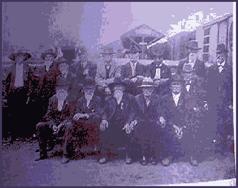Confederate Reunion Vidalia Georgia

The photo shown
is a reunion photograph taken in Vidalia Georgia around 1900. Included in
this photo in the back row are two black confederate soldiers. If you were to
multiply the two blacks out of a total of fifteen soldiers in the photo by
the tens of thousands of soldiers in the southern forces, you can get a
general idea of the sheer number of blacks involved in the Confederate army.
The story that I will tell you today is of a black soldier who was well
respected by all the citizens of the city of Atlanta in the peach state of
Georgia at the turn of the century. This black soldiers name was "Amos
Rucker". Amos Rucker born in Elbert county Georgia went to war with his
young master Col. Sandy Rucker, of the 33rd Georgia infantry. Mr. Rucker was
a body servant, at first showing prowess in the procurement of needed
supplies when no one else could. Amos did not remain a body servant, soon he
found himself in the thick of battle. Amos Rucker was a brave soldier, as he
picked up the bayoneted musket of a dead member of his unit and charged the
enemy line. He continued performing as a combat soldier for the remainder of
the war. One of Mr. Ruckerís duties was to call the roll after each battle.
He committed to memory the entire company. Before the surrender at Appomattox
Amos Rucker received a severe wound to his left breast and a leg wound that
left him permanently crippled. After the war Amos joined the W. H. T Walker
camp U. C. V in Atlanta. He faithfully attended each camp meeting and was
proud to show his excellent memory. He often recited the names of every
member from the old company from A to Z. It is said that he solemnly added after
each name "here or dead." The members of the camp provided well for
Mr Rucker, even helping him to acquire a house on the west side of Atlanta.
His attorney for the real estate transaction and for the settlement of his
estate as well as care of his dear wife, Martha was John M. Slaton, a member
of the John B. Gordon camp # 46 Sons of Confederate Veterans. Later as
Georgia Governor, Slaton commuted the death sentence of Leo Frank. Mr. Rucker
never missed a meeting, until just before his death when he sent a message to
the members, ďGive my love to the boys." Mr. Ruckerís death on August 10,
1905, brought universal sorrow to Atlanta. His body lay in state, while
hundreds of Atlantans representing many of the best families of the city
silently paid their respects. The members of Camp Walker took care of the
expenses and bought a plot for Rucker and his wife at South view Cemetery,
Where today members of the Martin Luther King family is buried. Funeral
services were conducted by Clement A. Evans of Atlanta, Confederate General
and U. C. V Commander in Chief. Mr. Ruckerís pallbearers were Gov. Allen D.
Chandler, Gen A .J. West, Judge William Lowndes Calhoun Jr., ex Postmaster
Amos Fox, Frank A. Hilburn, Commander of Camp Walker J. Sid Holland and R. S.
Ozburne. An article in the Confederate Veteran related the sadness: Very
tenderly they carried the old veteran to his grave, clothed in his uniform of
gray and wrapped in a confederate flag, a grave made beautiful by flowers
from comrades and friends, among whom a large design from the Daughters of
the Confederacy was conspicuous in its red and white." The Rev. Dr. T. P.
Cleveland led the prayer, and several of Amosís favorite songs were sung.
Just before the casket was lowered into the ground, Capt William
"Tip" Harrison read a poem entitled" When Rucker Called the
Roll." There was not a dry eye in the place, including his former
master, D. C .J. Cleburne, who had made the trip to Atlanta for the services.
Today the fine stone placed by the U. C. V in 1909 is gone and the grave of
the most beloved of black veterans is barren. Both Amos and his dear wife
Martha lie side by side, almost forgotten. Only the sextons map identifies
the spot. It is as if someone did not want us to know about poor old Mr.
Rucker. In fact there are probably hundreds of similar stories now lost. It
is out duty to bring them to the light. Our southern ancestors were as loyal
and as loving to those of there own race as any ever were, Black or White.
The story of Amos Rucker as well as others serve as clear reminders that we
must never forget, for if we discard our past , we then also throw away our
futures! Curtis Harris, Historian Dixie Camp #1861 Dixie Co. Florida.
Stiles
Akin Camp #670
Return to Camp Home
Webmaster

